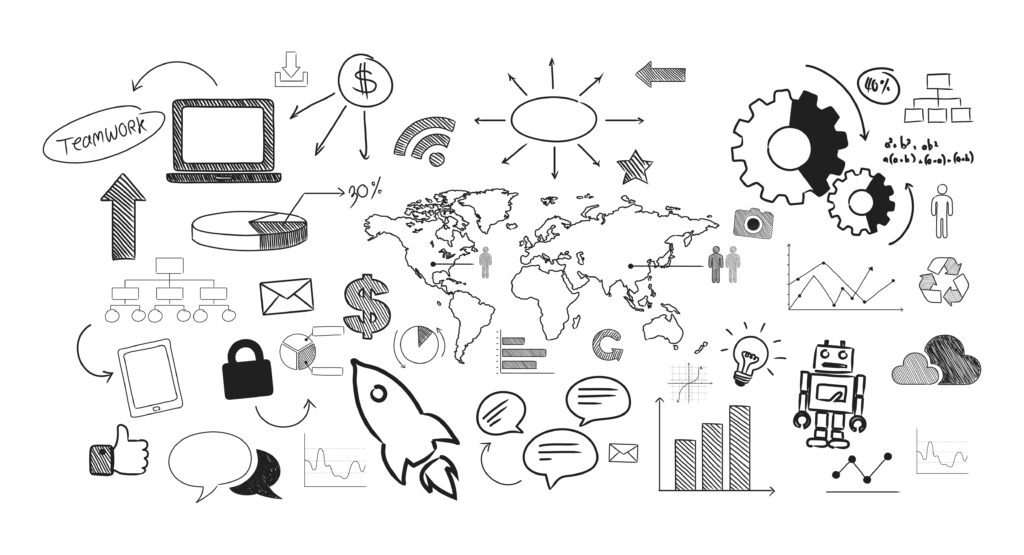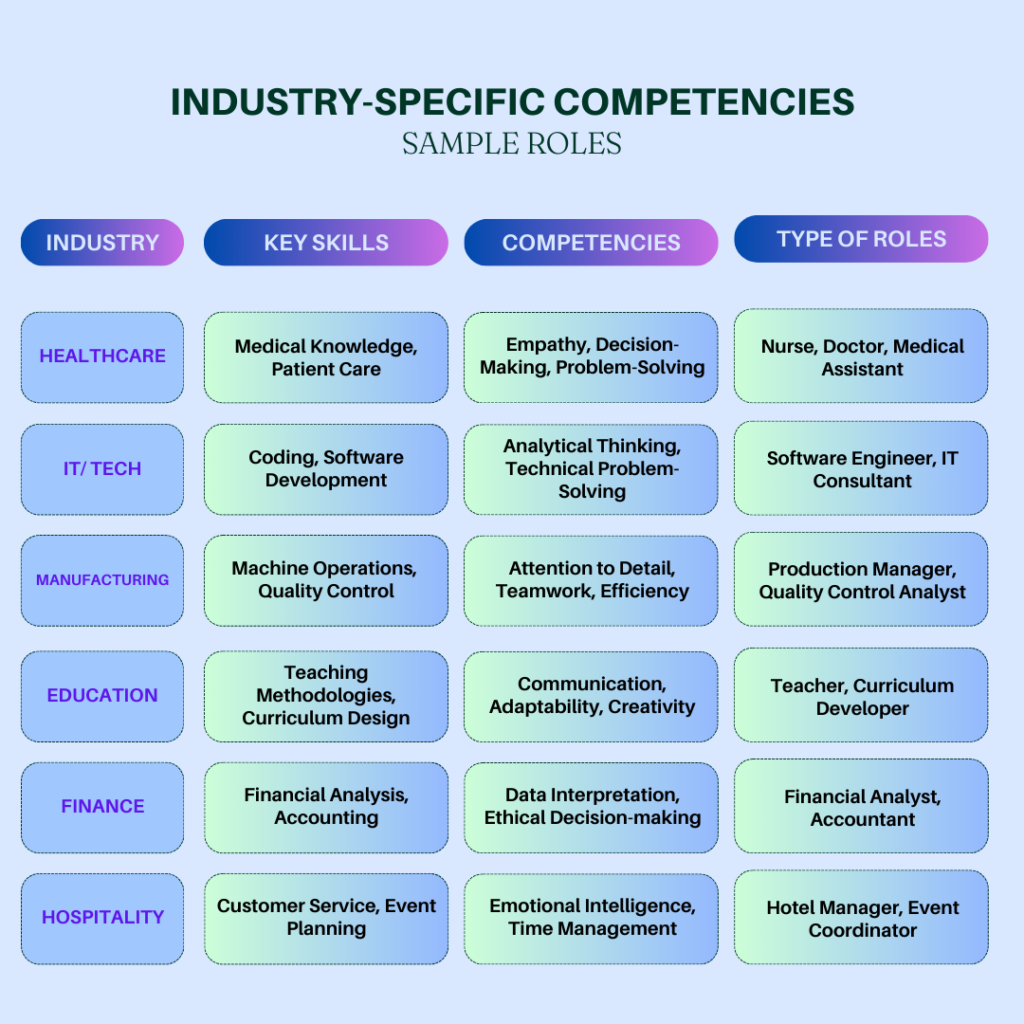Hiring the right talent goes beyond evaluating general qualifications—it’s about matching the exact skill set to the unique demands of your industry. Imagine using the same hiring assessments to recruit a financial analyst as you would for a marketing role. The result? You may end up with someone who shines in communication but lacks the deep analytical skills required for finance. This mismatch is more common than you think.
In fact, a Harvard Business Review study found that 80% of turnover stems from poor hiring decisions, often due to misaligned skill assessments.

So, how can businesses avoid this costly mistake? The answer is by designing sector-specific hiring assessments that target the precise competencies needed for each role. Whether you’re in tech, healthcare, or manufacturing, your recruitment process should reflect the specialized skills of the industry. In this blog, we’ll explore how to create strategic, tailored assessments and how platforms like PerspectAI are revolutionizing hiring through game-based evaluations that help uncover both technical and interpersonal strengths.
Are you ready to transform your recruitment strategy and find the perfect fit for your team? Let’s dive into how sector-specific assessments can make all the difference.
Understanding Sector-based Recruitment
Sector-based recruitment focuses on tailoring the hiring process to meet the unique demands of specific industries, such as healthcare, IT, manufacturing, education, and more. Each industry has its own set of technical and interpersonal skills that are critical to success in a particular role. While a general recruitment approach might work for some industries, specialized sectors require a more focused strategy to ensure that the right talent is brought on board.
Why a One-Size-Fits-All Approach Doesn’t Work
In recruitment, applying a one-size-fits-all model can lead to inefficiencies, mismatched hires, and higher turnover rates. HBR states that hiring managers often have a hard time trying to fully evaluate the specific competencies needed for their industry. This gap often results in hiring candidates who may excel in general skills but lack the industry-specific expertise that makes a real difference on the job.
Each sector demands a distinct set of qualifications and competencies. For example, a healthcare professional needs not only medical knowledge but also strong interpersonal and decision-making skills. A software engineer in IT requires advanced coding skills and technical problem-solving abilities. Treating these vastly different roles the same during the recruitment process can lead to subpar hires and long-term consequences for the organization.
Examples of Industry-specific Skill Sets and Competencies
Each sector requires a unique combination of skills and competencies that align with its core demands. Here’s a breakdown of industry-specific requirements:

Strategic Elements of Designing Hiring Assessments
Designing effective hiring assessments requires a deep understanding of both the role you’re hiring for and the specific skills required in that industry. To build a solid recruitment strategy, you need to focus on three key elements: Skills Gap Analysis, Competency Mapping, and Job-relevant Testing. Together, these approaches help ensure you’re not only attracting candidates with the right qualifications but also evaluating them on the competencies that matter most to your sector.
Skills Gap Analysis: Identifying Technical and Interpersonal Skills
The first step in designing a hiring assessment is conducting a skills gap analysis. This involves identifying the specific technical and interpersonal skills required for a given role. This process helps pinpoint the areas where potential candidates may fall short, ensuring the assessment focuses on evaluating those crucial gaps.
A 2020 report by the World Economic Forum highlighted that 94% of business leaders expect employees to acquire new skills as the job market continues to evolve. This underscores the importance of using hiring assessments that not only evaluate current skills but also highlight gaps for future development.
Competency Mapping: Aligning Job Roles with Essential Skills and Behaviours
Once you’ve identified the skills needed for the role, the next step is competency mapping. This involves aligning the role’s key responsibilities with the skills and behaviours essential for success. Competency mapping ensures that your hiring assessments evaluate not only technical abilities but also the behavioural attributes that make someone excel in the position.
For example, in the manufacturing industry, you may need to assess candidates for both technical proficiency in machinery operation and competencies like attention to detail and teamwork. Similarly, in education, a teacher must not only understand curriculum design but also exhibit creativity and adaptability in the classroom.

Job-relevant Testing: Evaluating Real-world Abilities
Generic assessments often fall short in identifying whether a candidate is truly capable of handling the demands of the role. This is where job-relevant testing comes in. By designing assessments that simulate real-world tasks and challenges, you can evaluate how candidates apply their skills and competencies in practical scenarios.
Why it matters:
- Improved hiring quality: Candidates who perform well in job-relevant scenarios are more likely to excel once hired.
- Reduced turnover: A study found that 43% of employees leave their roles because the job doesn’t meet their expectations. Job-relevant testing ensures candidates have a clear understanding of the role.
- Increased engagement: Candidates who experience realistic job previews through assessments tend to be more engaged and satisfied with their roles, as they know what to expect.
Customizing Hiring Assessments for Different Sectors
Hiring assessments are not one-size-fits-all. To ensure you’re hiring the right talent for your industry, you must tailor assessments to meet the specific demands of the role. Each sector requires unique skills and competencies, which should be reflected in the recruitment process. Customizing assessments for different sectors helps ensure you’re evaluating candidates on what matters most for success in that field.
Technical Domains: Tailored Assessments for IT, Engineering, and More
In technical fields such as IT, engineering, and finance, job-specific assessments are essential for evaluating a candidate’s expertise in complex skills like programming, data analysis, or systems design. Technical assessments should be designed to replicate the challenges that professionals face on the job, allowing you to see how candidates solve real-world problems.
Examples of Technical Assessments:
- IT (Coding Tests): Coding challenges and hackathons are commonly used in the tech industry to assess programming skills. These tests allow candidates to demonstrate their proficiency in specific programming languages like Java, Python, or C++, as well as their problem-solving abilities.
According to HackerRank, online coding assessments are the strongest tool hiring teams have to assess the soft and technical skills of a candidate.
- Engineering (Problem-solving Tasks): Engineering assessments may include tasks like solving complex mathematical problems, designing prototypes, or evaluating structural systems. For example, in mechanical engineering, candidates may be asked to analyze mechanical components and suggest improvements.
- Finance (Data Analysis): In finance, assessments often focus on evaluating a candidate’s ability to analyze financial data and make informed decisions. These tests may involve case studies where candidates are given datasets and asked to generate reports, provide financial forecasts, or identify trends.
These customized assessments ensure that you’re not just hiring someone with theoretical knowledge but someone who can apply their skills effectively on the job.
Non-Technical Domains: Behavioral Assessments for Education, Hospitality, and More
In non-technical domains, it’s often the behavioral and interpersonal skills that determine whether a candidate will thrive in a role. Sectors like education, hospitality, and healthcare require employees who excel in soft skills such as communication, emotional intelligence, and customer service.
Examples of Non-Technical Assessments:
- Education (Behavioural and Situational Assessments): In education, assessments might include evaluating a teacher’s ability to manage a classroom, adapt teaching methods for different learning styles, and handle difficult student interactions. Role-playing scenarios and situational judgment tests can be useful in these cases.
According to Gallup, more than six in 10 teachers are worried and frustrated. Less than 3 in 10 teachers feel confident and enthusiastic in their role.
- Hospitality (Customer Service Simulations): The hospitality sector thrives on providing excellent customer service. Assessments here might involve simulations where candidates are asked to resolve customer complaints or handle difficult situations. These assessments allow employers to evaluate a candidate’s emotional intelligence, patience, and problem-solving skills, which are critical for roles like front desk managers or event coordinators.
- Healthcare (Interpersonal Skills): In healthcare, patient care and bedside manner are just as important as technical medical knowledge. Assessments in this field might involve scenario-based testing, where candidates are given hypothetical patient cases and asked how they would interact with patients and families.
Nearly 67% of patients reported that their healthcare providers need to improve how they interact with patients.
PerspectAI’s Industry-Specific Hiring Assessments
Platforms like PerspectAI specialize in providing tailored, game-based assessments for both technical and non-technical domains. This is to ensure that every candidate is evaluated on the skills and competencies that matter most for their industry. By aligning your hiring assessments with the unique needs of your sector, you can significantly improve the quality of hires and the long-term success of your workforce.
PerspectAI revolutionizes recruitment with tailored, industry-specific assessments. This approach helps us dive deep into your unique job requirements, thus crafting a comprehensive evaluation process that goes beyond generic testing.
Key features of our approach:
- Job Description Analysis: We meticulously dissect each role to identify crucial skills and attributes.
- Competency Mapping: Our experts develop a custom competency framework aligned with your industry’s demands.
- Success Profiling: We create detailed profiles of top performers in your field, setting clear benchmarks for success.
- Industry-Specific Benchmarking: Your candidates are evaluated against standards specific to your sector, ensuring relevance and accuracy.
By combining these elements, we deliver assessments that not only identify the best talent but also predict their potential for success in your unique industry context.
Join us today!